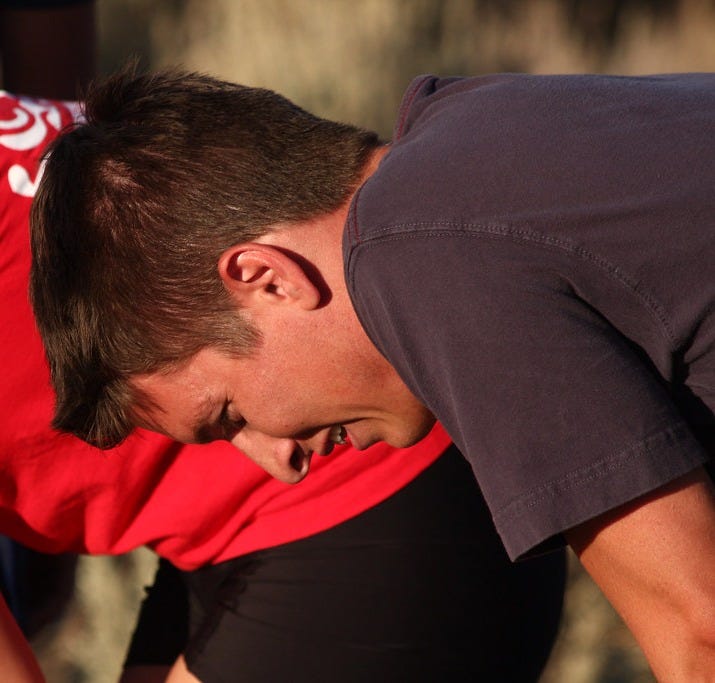First of all, every time you begin a good work,
you must pray to him most earnestly to bring it to perfection.
The Rule of Benedict, Prologue, line 4
Well begun is half done.
Socrates & Mary Poppins
Everything we do echoes in eternity, and so everything worthwhile should be done in and through Christ, and accompanied by prayer.
I know as well as anyone the difficulty of getting traction when setting out on a new task or goal. Perseverance is tough. Discipline is not easily arrived at. Endurance can seem impossible. Beginning well is a huge part of continuing well, and so we need to begin–and, often, begin again and again–in the right way.
So when Mary Poppins quotes Plato’s Laws to motivate the Banks children, she’s also echoing the Rule of Benedict. (My thesis “The Theological Praxis of Poppins: An Neoplatonist-Benedictine Interpretation” is forthcoming.)
Running on Empty
I was a cross country runner, and the first time I was sent out on a four-mile circuit at age 13 I thought I was going to drop dead, and assured myself I would quit and never do it again.
I’d like to tell you that I didn’t give up because I found some grit, that inner strength, that well of determination that carries us over the hard times.
Nope. I told them I quit the minute I got back, but they wouldn’t let me. The coach, the school, my parents: I was not going anywhere expect back on the four-mile route the next day, and the day after.
And in time, that discipline made me the best runner on the team?
Ahahahaha! No. I was awful. I slacked my way through to the end of that season and the next the best I could. That I continued is a lesson in obedience. That I could have done better if I didn’t rely on my own limited abilities is a lesson in prayer.
It is very difficult to achieve things by our own energies alone. Grinding only gets you far. I didn’t begin running with a healthy attitude, and tried to simply muscle my way through because I had to. That’s not a way to long term success. It’s the desire the achieve some end that makes the trials on the way bearable. There has to be a goal, and you have to believe in that goal. You have to both see it, and want it.
Ora et Labora
When those trials are particularly acute–terminal illness, tragedy, loss of income, crippling debt, trauma–it is not possible to bear them by focusing on any earthly goal. If we are to complete something large, something that literally brings God into the world through our presence, then we need to go deep into prayer, and stay with prayer, and begin and end with prayer, to keep God at our side and in our hearts at all times.
Every good impulse we have is rooted in the Holy Spirit within us. Only the One who is Goodness can be the source of goodness. And so as we begin each act, we need to root ourselves firmly in the Lord before beginning. This even applies to things that seem unrelated to the spiritual life, such as improving our physical fitness or tending to our work. Our bodies are a gift of God and maintaining them through the often difficult disciplines of diet and exercise is something worthy of prayer to complete. And I say this as someone who routinely fails at both. Similarly, our work is integral to our life in giving it purpose and in allowing us to live in the world.
It is here, by line four, that we already encounter the two defining themes of Benedictine life: work and prayer. Ora et labora.
This line of the rule specifically addresses good works (inchoas bonum), and we know that doing genuinely good works can often be difficult and unrewarding. The corporal and spiritual works of mercy draw their power from the Holy Spirit, and in turn we make the Spirit present in the world through them. This is like a spiritual fission reaction or a perpetual motion machine, and once you get it up and running, it can often, strangely, become easier, almost self-perpetuating.
Get Out of Your Own Way
My first day of visiting hospital sick rooms was terrifying, as was my first day serving in grief ministry. Part of that is natural anxiety and fear of the unknown whenever embarking upon something new, but the very real issue each time out is that I’m encountering vulnerable and suffering human beings, often at the lowest moments of their lives. The chance for a misstep, the danger of doing damage, is very real, and I have no natural aptitude for this work whatsoever. I am, by any reasonable measure, absolutely the last person you should send into a sickroom or a funeral.
And yet, before beginning, I let go and pray, and I feel that it’s not just me in there. I am not alone, and that my sole–genuinely sole–task is to get out of the way of the Spirit and let him do his work.
And he does. He wants to. He wants you to complete your good works. He wants those works to glorify God. All we must do is get out of our own way.
And so I not only managed to get through those first days, but I managed, against all reason, to thrive so much that I continued in both ministries after my pastoral practicum was over. And they have yielded so many graces for me and, I’m told, for others.
That’s not me doing the hard part. I’m not capable of it. I know that. That’s me letting go, praying for the work to be completed as God wills it, and then letting the spirit use me as he will.
“I am not alone.
I do not have to carry alone
what in truth I could never carry alone."
Pope Benedict XVI





